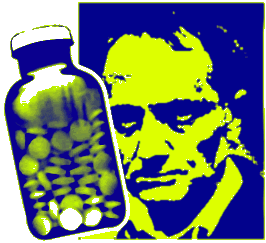
Halloween came and went with nothing more than a mild hangover and fewer than four of those adventures for which this pagan fest is notorious. Such paucity of personal experience testifies to the onset of wisdom, which some people are born with, while others have to work hard for. I am among those who must labor for it, hoping that the weight of years, the sheer physical limit, and a certain amount of, let's say, learning might bring it on.
It wasn't that I was born a fool, but I have practiced foolishness by necessity, because of my profession. Being a poet in a world that values engineers is no picnic; it requires large amounts of clowning, self-deprecation, prankishness, flouting of the social, economic, and physical order, as well as an encyclopedic knowledge of weapons of psychological warfare against boredom. The job of keeping oneself and others entertained is sisyphian and, in the past, it was associated with syphilis as well as Sisyphus, as evidenced by some of the giants of our profession -- men like Charles Baudelaire.
In any case, no amount of provocation or plain flummery suffices to see a poet into middle age, by which time the poet, if he's still around, begins dreaming of a nice boat in the swamp or a modest vineyard where the only duties are strictly physical. Foreseeing these difficulties, some members of our profession have striven to change the primal directive from "envirez vous" (which can only be said in French) to something closer to becoming a philologist or a lepidopterist.
Leaving behind thousands of years of romantic fatalism is no easy task, though, and it has the disadvantage of making poets extremely marginal in a world where they are already considered nonexistent. The only chance poetry has of being enormously relevant is for poets to say so over and over, in more and more outrageous ways, until the world capitulates.
Which it seems to be doing, if you ask me. In the not very distant past, even average people operating with inherited wisdom had some semblance of inner life. They used to walk around thinking that they had private thoughts which, no matter how rudimentary, were secret and thus generated some individual uniqueness and a certain amount of pride. These days, however, in the age of indiscriminate information and lack of any sort of taboos -- except maybe incest -- everybody's thoughts are everybody else's and hang there for the taking on TV and in cyberspace.
There is no longer any sort of private inner life which relieves people of the painful, though often pleasant, task of walking upright. Instead, everybody crouches, crawls, or lounges in front of some screen, watching simulacra of what they used to think play in front of them in living color. Taking over the world under these circumstances is a piece of cake, and poets are in an ideal position to do so. Before everybody evaporated in cyberspace, only the very best poetry could link people's private thoughts to a wider context. Now, freed of the necessity to link anything, poets can just plant their flags in the psychic mud and claim victory. But the price, the price! The hangovers, the nausea, the sense of futility!
Well, I'm not complaining, but what's there left to do after winning? Slide through Halloween like a normal person and attempt some wisdom, watch TV, what the hell.
Andrei Codrescu is the editor of Exquisite Corpse: A Journal of Letters & Life, now online at www.corpse.org.
Bad Byte runs every other Tuesday on GettingIt.
